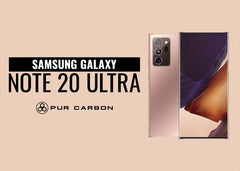5G isn't just coming, it's already available in a number of areas. All four of the primary carriers across the United States feature various levels of 5G service, at the time of writing, and it's expanding on a monthly basis. With so much discussion on this topic and so much mis-information out there, the whole concept of 5G can be a bit confusing to many consumers. So we decided to dig into this topic a bit and hopefully answer some common questions.
What Is 5G?
Simply put, 5G just means "Fifth Generation" Cellular Wireless, in the same sense that most current phones operate with 4G (or "Fourth Generation") technology. 5G service is available in three primary categories. They are labeled as low-, mid-, and high-band, which refers to the frequencies of the signals they carry. Currently, each band is incompatible with one another and each works very differently. At the moment, the most widely available version of 5G works only slightly better than 4G, but of course, this is expected to rapidly change as technology progresses.
By looking at the history of 4G, we can get a look at how 5G is likely to roll out and become mainstream. 4G phones started appearing on the US market in 2010, but the real power of 4G wasn't unleashed until a few years later. Snapchat arrived in 2012, and 2013 brought us video calling on LTE networks, as well as Uber. 5G will likely kick in much more significantly when various apps unleash its full potential in the coming years.
Is It Here Already?
Advertising for 5G technology certainly seems to be ramping up. So if you're looking for your next phone and case to last you more than a year or so, it could be worth looking into a 5G-compatible phone, even if the game-changing 5G apps don't show up until 2021 or later.
The early standards for 5G were decided on near the conclusion of 2017. However, since this technology is still in its early stages, these standard aren't 100% consistent quite yet and can vary from place to place. Right now, the areas with super fast 5G signal are mostly found in relatively small pockets of limited coverage. Outside of these areas, expect it to be slow, yet a bit more responsive than 4G.
1/2/3/4/5G
Some phone carriers and retailers are already mentioning terms like '5G E' or '5G Wi-Fi'. But take these with a grain of salt. They're not exactly full 5G technology. You might also hear some talk of millimeter-wave towers on each light pole up and down the street, that's not happening yet either, at least not in most places.
Again, the G in 5G (or 4G, or 3G, etc.) stands for nothing more than 'generation' because it's the fifth generation in the progression of wireless technology. The five generations are delineated by the various data transmission ranges they offered, and they're separated by different encoding methodologies that made them incompatible with prior generations.
1G was just analog cellular. Digital cellular technology started with 2G, and 3G opened up megabits per second, while 4G technologies soared into the gigabits for some speeds.
5G Features
5G technology most likely won't be compatible with older technologies or phones, but it will bring three primary features. First, there will be bigger data channels, which means data will transfer more easily, smoothing out your streaming and downloads. Second, it features lower latency, which means less lag, resulting in your mobile experience being more responsive in terms of loading websites, music, and YouTube videos faster than ever. Third, users are going to have the ability to connect many more devices to the network at one time, including smart devices and sensors, that will enable you to have a lot more control over appliances and other things in your home (See IOT).
4G Vs 5G Right Now
No doubt 5G technology is very promising, but it's an investment into the possibilities across the market over the next decade. Until there are killer apps and a spike in urban coverage, 5G will be more bragging rights than something you could actually use on your new phone. As a matter of fact, 4G technology is likely to keep improving until 5G completely takes over. New phones with the Qualcomm X24 modem, which is in the majority of Android flagship phones made in 2019, can sport 4G speeds as fast as 2 gigs per second.
If you do want to move up to 5G to have a 'future-proof' phone, you can be in great position to take advantage of the benefits as they happen. Just make sure that you actually have a 5G phone. AT&T is branding its current 4G network as '5G Evolution', but again, this is somewhat misleading. It's a crucial step in the right direction, no doubt, but it's still not actual 5G.
Low/Middle/High
5G has more airwave options for carriers than 4G did. One crucial win for carriers is how the 'high-band' is now open for short-range airwaves that 4G technology couldn't touch, which means a lot more room for data and bandwidth to be transmitted. 5G is able to run on all frequencies, which is why three different 5G experiences are possible now.
The difference between the low-, mid, and high-bands will have an impact on your experience based on where you're using your device. High-bands are more likely to operate in urban areas, whereas low-bands are going to be more prevalent in rural areas. At the time of writing, no 5G phones have all three bands, mostly due to low and high technology compatibility issues. So if you're in the market for a new phone right now, definitely have a look at the specifications in order to choose a phone with the bands most appropriate for your circumstances. Also, it's a good idea to make sure the device is still 4G-compatible so you can still utilize the digital bandwidth outside of 5G areas.
Protect Yourself
Here are a few things to consider when looking for your next phone:
- Wait for a phone that is compatible with all three 5G bands (low, mid, and high). It's looking like Samsung will be the first one to do this, but they certainly won't be the last.
- Get a warranty for your phone. Even budget models can cost a lot, and phones are very susceptible to damage, so protect your investment. If 5G isn't likely to be in your area for a while, stick with 4G for now.
- Protect your investment with a durable case. Aside from protecting the chunk of money you spent on your new phone, you use it for everything; texts, emails, phone calls, YouTube videos, streaming music, work, and financial transactions, on top of finding tonight's Chinese takeout or hailing a ride. The right case can not only keep your phone well-protected from daily wear & tear, but it can also let you customize the aesthetic look of your phone to suit your own personality and style.







Irena
July 11, 2020
would it be appropriate to buy a huawei with 5 G?